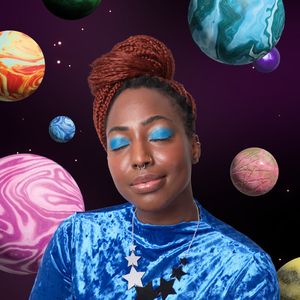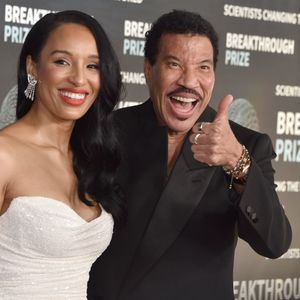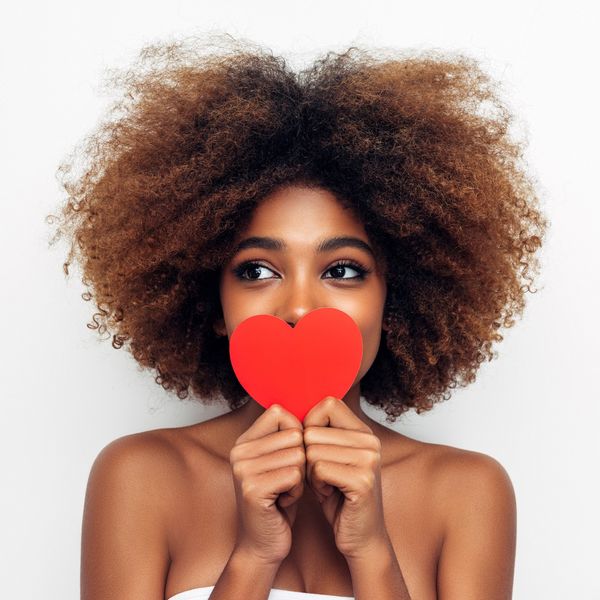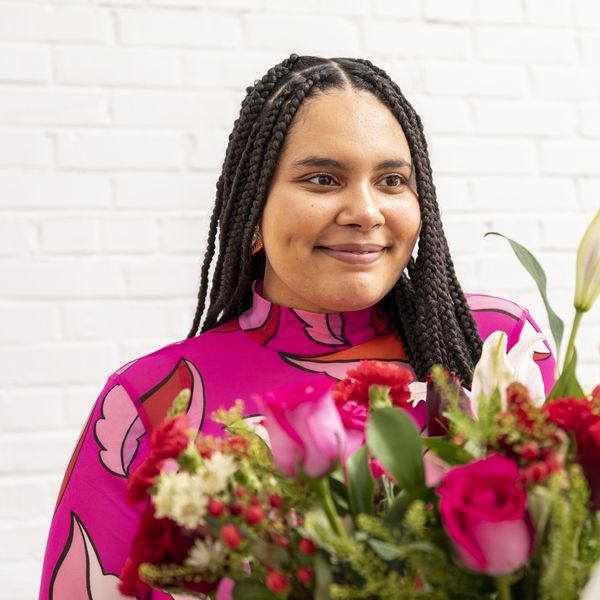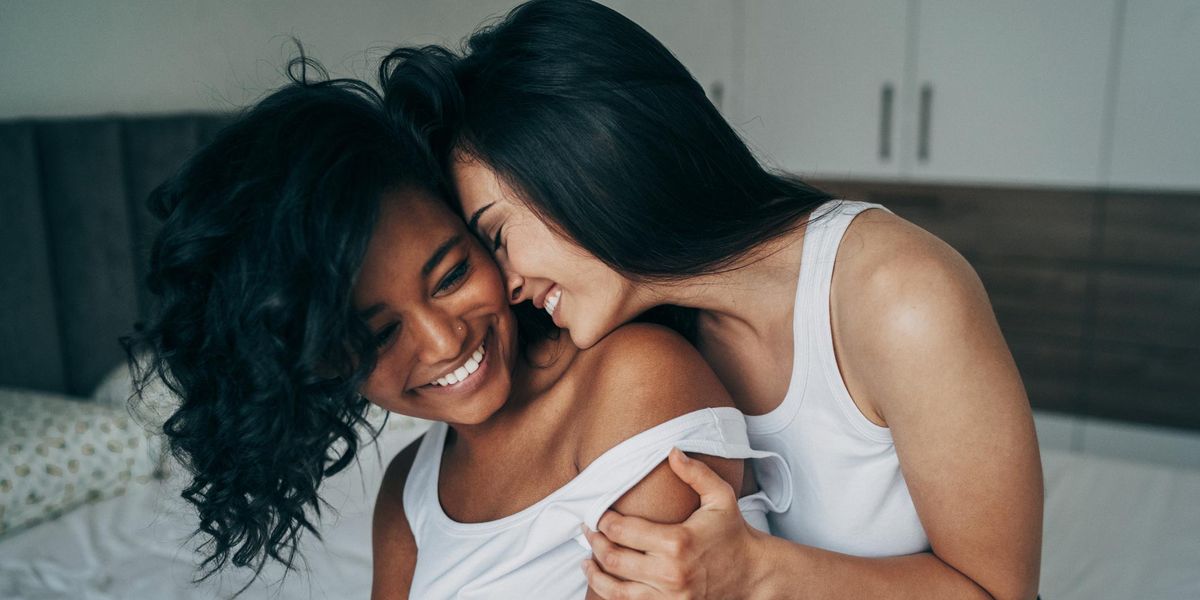
Awkward Things People Say To Me Once They Learn That I'm Bisexual
It's not unusual for a bisexual woman to be unidentifiable at first glance. And why should we be? There's no uniform for nonconformity. Sexual orientation shouldn't warrant a certain look or dress, or some occult tattoo. It is a state of being and taking unapologetic ownership in who you are and what you desire. It might come as a surprise to learn that despite how much I own and love my bisexuality, I've had to stop talking to my friends about being interested in and attracted to women almost entirely.
Unfortunately for me, and many others, being open and honest about who you are and who you desire doesn't eliminate the long-standing cognitive dissonance that straight men experience when you try to inform them of this.
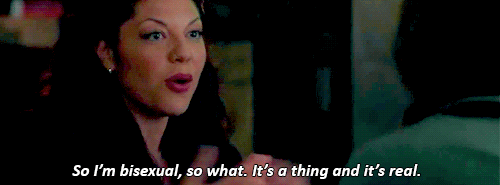
Just last week a guy friend of mine—and I'm using the term "friend" very loosely— texted me and asked me if I'm bi. Out of the blue, I might add. I quickly prepared for the f*ckery that was about to ensue and started to consider that a learning opportunity for my “friend."
His response:
"I didn't know you consider yourself that. I got somebody we can have fun with."
My first reaction wasn't visceral, although my temper was reaching a fever pitch.
I remained cool and politely began to educate him on all the ways that women do just fine enjoying sex in the absence of men. And then, I respectfully declined his offer and sent him on his way with a “now go f*ck yourself, have a nice day" text.
What's even more surprising is my exchanges with straight women aren't much better.
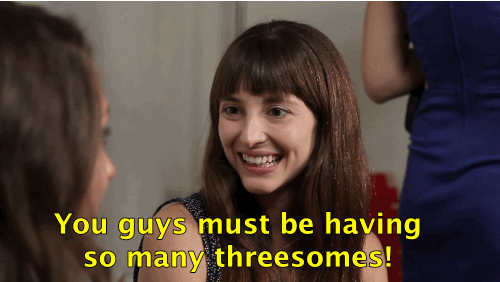
They assume that I must've had a threesome before, or I'm at least interested in having one. They want to know how many girls I've been with. They may start scouring the room to identify which girl looks like my type or feel compelled to ask about my religious beliefs. Or worse, they misinterpret me owning my sexuality as an invitation for them to “explore" their own sexuality using my body.
That's no different than a man objectifying a woman.
Lucky for them, I'm always available to help women identify when they're operating from a heterosexist disposition. In fact, I once had a three-year on-again, off-again situationship with a woman.
This woman just so happened to also have an on-again, off-again boyfriend the entire time. She knew my family and friends. We'd go on trips, spend birthdays and holidays together. But after coming to the realization that she herself didn't consider herself bisexual, and that she associated bisexuality as something to be ashamed of, the secrecy of it all began to smother me.

During that same three-year time span, I dated men. One of them, after learning I was bisexual, began thinking I would cheat on him with my then off-again girlfriend. I later determined it had nothing to do with me but that my sexuality in and of itself was an attack on his male ego. And the other decided that my being bisexual meant he was free to date and sleep with whomever. He tried to use my sexuality against me to argue this to his advantage.
The overarching theme in all of this?
Women should be allowed to own their sexuality without being deemed sexual deviants. It perpetuates the idea that there's a “norm" to deviate from. I'm not knocking open relationships or promiscuity. In fact, women should feel empowered in expressing their sexuality. But monogamy and bisexuality are not mutually exclusive, in the same way that women's agency cannot be trivialized to the heterosexual women's refusal to be objectified by men.
The brain has a natural tendency to categorize people and things to make easier to understand, sure. But leaning on someone's sexual orientation to determine his or her sexual behavior is a reach.
The notion that bisexual women are having twice the fun: false.
I can't speak for all bisexual women but I can say my sex life far less exciting than the common misperception suggests.
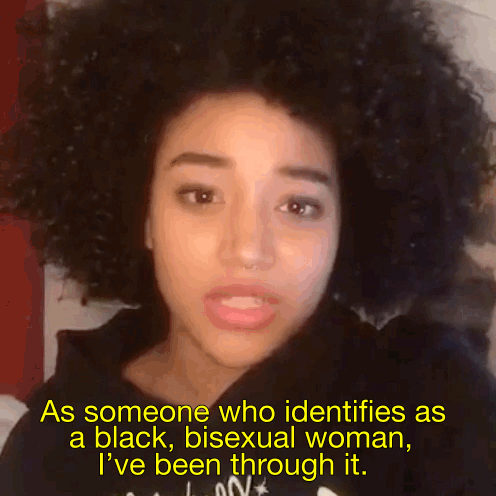
Bisexuality is self-defining in the same way that any other woman chooses to express her sexuality. Imagine if we labeled every woman who has had sex before marriage as a hoe. We don't. Instead, we champion women who are single mothers, encourage women who speak out to dismantle rape culture, we commend women for their fearlessness in making all body types sexy and recognize them as being worthy of having love, too, regardless of whether they're promiscuous or not.
As we should.
That should apply to bi women as well. We should protect one another against prejudices rooted in the heteronormative and misogynistic ways of thinking that objectify women or reduce them to their sexuality.
So much of understanding others is about challenging preconceived notions with conversation.
If nothing else, take from this that being open to connecting and expressing a genuine interest in someone of the same sex is a far cry from being casual and unselective in a person's approach to sex and relationships.
It would be truer to say, then, that anyone has the potential to be promiscuous regardless of who they're attracted to.
Featured image by Getty Images
- Why This Woman Chooses To Embrace Polyamory In Her Marriage ... ›
- 'Harlem' Black Male Bisexuality, Evolution On-Screen ›
- Bisexual meaning | 11 common misconceptions about bisexuals that ... ›
- 7 Misconceptions About Bisexuality We Need To Get Over ›
- Bisexuality: the definition and misconceptions | British GQ ›
- 16 Misconceptions About Being Bisexual | Teen Vogue ›
- Are Bisexuals Really Less Monogamous Than Everyone Else ... ›
- The Myth Of Bisexuality, the Shame of Promiscuity, and Other ... ›
- Bisexual Women, Non-Monogamy and Differentialist Anti ... ›
DeJanae Evins is a certified cannabis educator, consultant and the creator of GreenGoddessGlow, a digital resource at the intersection of cannabis and wellness encouraging mindful cannabis self-care practices. Evins is also a freelance health and wellness writer often discussing topics around sexual health and women's empowerment. Since learning about the Plant Queendom and the many ways we can use plant medicine to heal ourselves both individually and on a global scale, Evins has been vocal in both the cannabis and wellness communities about integrating cannabis in her approach to holistic health. Follow her on Instagram and Twitter @dejanaetanye.
ItGirl 100 Honors Black Women Who Create Culture & Put On For Their Cities
As they say, create the change you want to see in this world, besties. That’s why xoNecole linked up with Hyundai for the inaugural ItGirl 100 List, a celebration of 100 Genzennial women who aren’t afraid to pull up their own seats to the table. Across regions and industries, these women embody the essence of discovering self-value through purpose, honey! They're fierce, they’re ultra-creative, and we know they make their cities proud.
VIEW THE FULL ITGIRL 100 LIST HERE.
Don’t forget to also check out the ItGirl Directory, featuring 50 Black-woman-owned marketing and branding agencies, photographers and videographers, publicists, and more.
THE ITGIRL MEMO

I. An ItGirl puts on for her city and masters her self-worth through purpose.
II. An ItGirl celebrates all the things that make her unique.
III. An ItGirl empowers others to become the best versions of themselves.
IV. An ItGirl leads by example, inspiring others through her actions and integrity.
V. An ItGirl paves the way for authenticity and diversity in all aspects of life.
VI. An ItGirl uses the power of her voice to advocate for positive change in the world.
Let’s make things inbox official! Sign up for the xoNecole newsletter for daily love, wellness, career, and exclusive content delivered straight to your inbox.
You've Never Seen Luke James In A Role Quite Like This
Over the years, we've watched Luke James play countless characters we'd deem sex symbols, movie stars, and even his complicated character in Lena Waithe's The Chi. For the first time in his career, the New Orleans-born actor has taken on a role where his signature good looks take a backseat as he transforms into Edmund in Them: The Scare—a mentally deranged character in the second installment of the horror anthology series that you won't be able to take your eyes off.
Trust us, Edmund will literally make you do a double take.
xoNecole sat down with Luke James to talk about his latest series and all the complexity surrounding it—from the challenges taking on this out-of-the-box role to the show's depiction of the perplexing history of the relationship between Black Americans and police. When describing the opportunity to bring Edmund's character to life, Luke was overjoyed to show the audience yet another level of his masterful acting talents.
"It was like bathing in the sun," he said. "I was like, thank you! Another opportunity for me to be great—for me to expand my territory. I'm just elated to be a part of it and to see myself in a different light, something I didn't think I could do." He continued, "There are parts of you that says, 'Go for it because this is what you do.' But then also that's why it's a challenge because you're like, 'um, I don't know if I'm as free as I need to be to be able to do this.' Little Marvin just created such a safe space for me to be able to do this, and I'm grateful for everything I've been able to do to lead to this."

Them: The Scare, like the first season, shines a light on the plight of Black Americans in the United States. This time, the story is taking place in the 1990s, at the height of the Rodney King riots in Los Angeles. While the series presents many underlying themes, one that stands out is Black people and the complicated relationship with the police. "For the audience, I think it sets the tone for the era that we're in and the amount of chaos that's in the air in Los Angeles and around the country from this heinous incident. And I say it just sets the tone of the anxiety and anxiousness that everybody is feeling in their own households."
James has been a longtime advocate against police brutality himself. He has even featured Elijah McClain, the 23-year-old Colorado man who died after being forcibly detained by officers, as his Instagram avatar for the past five years. So, as you can imagine, this script was close to his heart. "Elijah was a soft-loving oddball. Different than anyone but loving and a musical genius. He was just open and wanted to be loved and seen."

Luke continued, "His life was taken from him. I resonate with his spirit and his words...through all the struggle and the pain he still found it in him to say, 'I love you and I forgive you.' And that's who we are as people—to our own detriment sometimes. He's someone I don't want people to forget. I have yet to remove his face from my world because I have yet to let go of his voice, let go of that being [because] there's so many people we have lost in our history that so often get forgotten."
He concluded, "I think that's the importance of such artwork that moves us to think and talk about it. Yes, it's entertaining. We get to come together and be spooked together. But then we come together and we think, 'Damn, Edmund needed someone to talk to. Edmund needed help... a lot [of] things could have been different. Edmund could have been saved.'
Check out the full interview below.
Luke James Talks Ditching Sex Symbol Status For "Them: The Scare", Elijah McClain, & Morewww.youtube.com
Featured image by Getty Images

